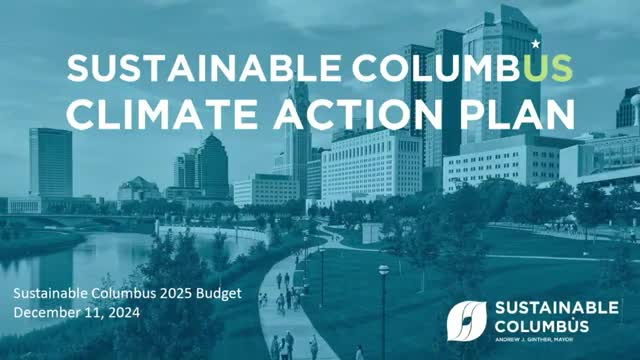Sustainable Columbus budgets workforce and efficiency programs, cites multiple federal grants
January 01, 2025 | Columbus City Committees (Regular Meetings), Columbus, Franklin County, Ohio
This article was created by AI summarizing key points discussed. AI makes mistakes, so for full details and context, please refer to the video of the full meeting. Please report any errors so we can fix them. Report an error »

Sustainable Columbus briefed the committee on goals from the Columbus Climate Action Plan and the office’s 2025 budget priorities, including workforce development, residential energy efficiency and grant‑funded projects.
Grayson Hart, Climate Action Plan Implementation Manager for Sustainable Columbus, said the office’s general‑fund personnel budget is “just under $1,000,000” to support nine full‑time staff in citywide sustainability. Hart said the Department of Public Utilities (DPU) has additionally allocated “just over $1,200,000” from enterprise funds for DPU sustainability staff and projects.
Hart outlined planned program spending: approximately $600,000 for professional services and materials, and a $3,150,000 general‑fund allocation to support workforce programs and energy efficiency initiatives. Of that $3.15 million, Hart said $1,650,000 is intended for workforce pathways in clean energy (the Empowered program in partnership with Impact Community Action) and $1,500,000 will support a “clean clothes” initiative and enhanced weatherization for Columbus opportunity neighborhoods that fall just outside federal eligibility thresholds.
Climate plan goals and federal grants
Hart emphasized the Columbus Climate Action Plan targets — a 45% greenhouse‑gas reduction by 2030 and carbon neutrality by 2050 — and described four federal awards the office is using or pursuing: $778,900 from the U.S. Department of Energy (energy efficiency formula funding), $1,000,000 from the U.S. Environmental Protection Agency to update the Climate Action Plan and create a regional plan, a multijurisdictional building‑performance grant partnership with other Ohio cities supported by Department of Energy funding, and a $50,000 Bloomberg Youth Climate Action Fund award for youth microgrants.
On federal funding stability, Hart said funding directly awarded to the city is secure but the office continues to assess how federal administration changes could affect some state‑level rebate and solar program dollars. “With the uncertainty at the federal level, local leadership is all the more important to secure our climate commitments,” Hart said.
Why it matters
Sustainable Columbus’ budget lines and grants fund workforce training, home‑energy interventions and technical support that city officials said are intended to reduce energy burdens for households, create clean‑energy pathways for residents and support the city’s climate targets. Councilmembers asked whether the 2025 budget will allow the office to meet near‑term (2025) targets; Hart said the allocation and citywide staffing attention will help meet 2025 milestones that feed toward 2030 goals.
Grayson Hart, Climate Action Plan Implementation Manager for Sustainable Columbus, said the office’s general‑fund personnel budget is “just under $1,000,000” to support nine full‑time staff in citywide sustainability. Hart said the Department of Public Utilities (DPU) has additionally allocated “just over $1,200,000” from enterprise funds for DPU sustainability staff and projects.
Hart outlined planned program spending: approximately $600,000 for professional services and materials, and a $3,150,000 general‑fund allocation to support workforce programs and energy efficiency initiatives. Of that $3.15 million, Hart said $1,650,000 is intended for workforce pathways in clean energy (the Empowered program in partnership with Impact Community Action) and $1,500,000 will support a “clean clothes” initiative and enhanced weatherization for Columbus opportunity neighborhoods that fall just outside federal eligibility thresholds.
Climate plan goals and federal grants
Hart emphasized the Columbus Climate Action Plan targets — a 45% greenhouse‑gas reduction by 2030 and carbon neutrality by 2050 — and described four federal awards the office is using or pursuing: $778,900 from the U.S. Department of Energy (energy efficiency formula funding), $1,000,000 from the U.S. Environmental Protection Agency to update the Climate Action Plan and create a regional plan, a multijurisdictional building‑performance grant partnership with other Ohio cities supported by Department of Energy funding, and a $50,000 Bloomberg Youth Climate Action Fund award for youth microgrants.
On federal funding stability, Hart said funding directly awarded to the city is secure but the office continues to assess how federal administration changes could affect some state‑level rebate and solar program dollars. “With the uncertainty at the federal level, local leadership is all the more important to secure our climate commitments,” Hart said.
Why it matters
Sustainable Columbus’ budget lines and grants fund workforce training, home‑energy interventions and technical support that city officials said are intended to reduce energy burdens for households, create clean‑energy pathways for residents and support the city’s climate targets. Councilmembers asked whether the 2025 budget will allow the office to meet near‑term (2025) targets; Hart said the allocation and citywide staffing attention will help meet 2025 milestones that feed toward 2030 goals.
View full meeting
This article is based on a recent meeting—watch the full video and explore the complete transcript for deeper insights into the discussion.
View full meeting
